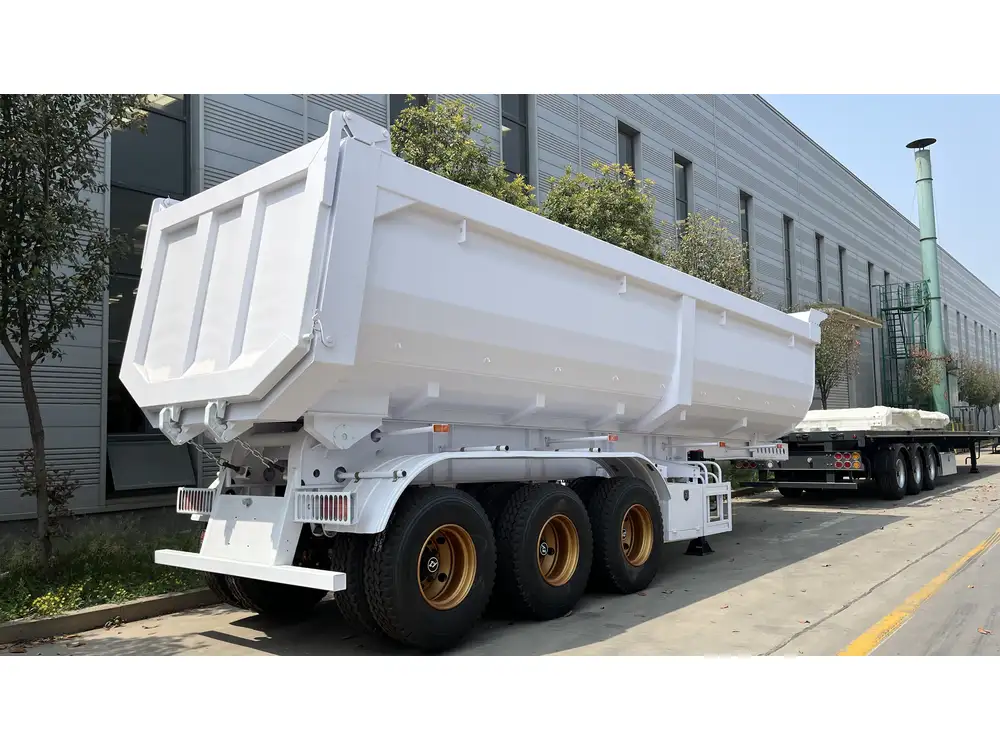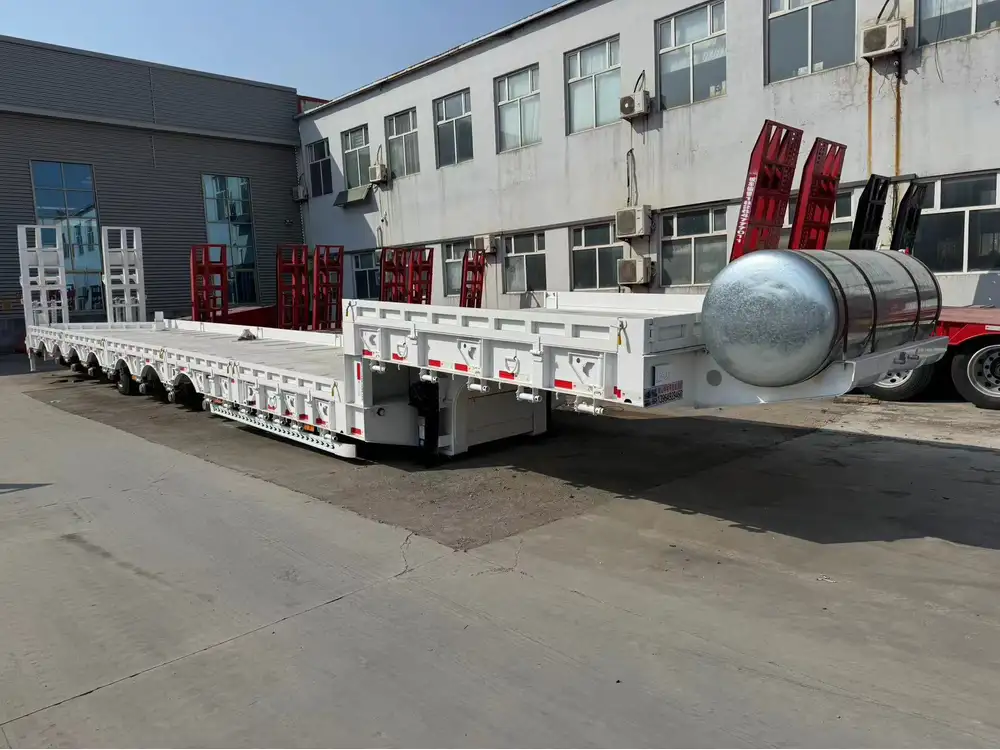When navigating the vast landscape of trucking and logistics, one fundamental question emerges: how much does a flatbed trailer for a truck weigh? The weight of a flatbed trailer, an essential component for the transportation industry, can significantly influence various aspects of vehicle operation, load management, and overall compliance with regulatory standards. This comprehensive guide will delve into the factors influencing the weight of flatbed trailers, the impact it has on trucking operations, and key considerations for manufacturers and users alike.
The Average Weight of Flatbed Trailers
Standard Weight Categories
Flatbed trailers come in various configurations and sizes, primarily categorized by their design and load capacity. Understanding these differences is crucial for accurate weight estimations.
| Trailer Type | Average Weight (lbs) | Load Capacity (lbs) |
|---|---|---|
| 48-foot Flatbed | 15,000 – 18,000 | 40,000 – 48,000 |
| 53-foot Flatbed | 16,000 – 20,000 | 45,000 – 52,000 |
| Lowboy Trailer | 20,000 – 25,000 | 60,000 – 70,000 |
| Step Deck Trailer | 15,000 – 20,000 | 40,000 – 48,000 |

Factors Influencing Trailer Weight
Various elements contribute to the overall weight of a flatbed trailer. These include:
Material Composition: The manufacturing materials (steel, aluminum, etc.) play a significant role in weight variance. Aluminum trailers typically weigh less than their steel counterparts yet can maintain similar strength and load capacity.
Design Features: Additional structural components such as reinforced frames, extended decks, or integrated toolboxes can increase the overall weight of a trailer.
Included Accessories: Features such as landing gear, tarps, and winches contribute to added weight. Understanding how these accessories affect the total weight is essential for load calculation and compliance with weight restrictions.
Tire Configuration and Size: The choice of tires impacts not only the trailer’s handling capabilities but also its weight. Larger, more robust tires generally add extra pounds.
Regulatory Compliance: Different regions have unique stipulations regarding weight limits. A trailer designed for heavy-duty hauling might feature a weightier construction to safely transport maximum allowable loads.
How Weight Affects Trucking Operations
Compliance with Regulations
Ensuring that a flatbed trailer meets state and federal weight regulations is paramount for the trucking industry. Most jurisdictions enforce strict weight limits, often based on the type of vehicle and the number of axles. Here’s how weight affects compliance:
Maximum Gross Vehicle Weight Rating (GVWR): This rating, provided by governmental regulations, defines the maximum permissible weight of the entire vehicle, including the trailer and the load. Exceeding this limit can result in hefty fines and penalties.
Bridge Laws: Many states impose bridge laws, which consider the distribution of weight across axles and specify limits to prevent structural damage to roadways and bridges.

Fuel Efficiency Considerations
The weight of a flatbed trailer directly influences fuel efficiency. Heavier trailers generally require more power to tow, which leads to increased fuel consumption. Conversely, lighter trailers can enhance overall fuel economy, translating to lower operational costs over time.
Load Management
Accurate weight management is critical for effective load distribution. Overloading, even within legal limits, can lead to uneven weight distribution, compromising the vehicle’s stability and safety on the road. Proper load management involves:
Weighing Loads: Prior to departure, it’s essential to weigh the truck and trailer to ensure compliance with weight regulations.
Balancing Loads: Ensuring that the cargo is evenly distributed throughout the trailer can enhance safety and performance.
Utilizing Technology: Modern weigh scales and load management software assist in accurately calculating and distributing weight across the trailer.
The Importance of Knowing Your Trailer Weight

Maintenance and Safety Implications
Understanding the weight of a flatbed trailer is key to maintaining the vehicle’s integrity and ensuring road safety. Regular maintenance checks should factor in:
Tire Health: Overloaded or unevenly distributed weight can lead to premature tire wear.
Brake Durability: Heavier trailers require more robust braking systems. Knowing the weight helps truckers maintain proper brake performance.
Frame Integrity: Constant exposure to excessive weight can result in structural issues, compromising long-term usability.
Resale Value Considerations
When it comes to selling or upgrading a flatbed trailer, weight and construction type can significantly impact resale value. Lighter, aluminum models might offer higher resale prices due to their operational efficiency, while heavier trailers might appeal to specific niche markets requiring durable, heavy-duty transport options.
Key Questions and Answers About Flatbed Trailer Weights

What is the maximum weight allowed for flatbed trailers in the U.S.?
The federal standard maximum weight for flatbed trailers typically caps at 80,000 pounds for a combination of tractor and trailer. However, individual states may impose their own regulations, which can vary.
How can I ensure my flatbed trailer meets weight compliance?
Regularly submit your truck and trailer for tandem weigh-ins at certified scales. Utilize onboard load cell systems, which provide real-time weight readings, allowing for immediate adjustments to maintain compliance.
Are lighter flatbed trailers worth the investment?
Indeed, lighter trailers can enhance fuel efficiency and reduce operational costs. When coupled with appropriate load management practices, they can offer a compelling value proposition for long-haul trucking firms.

What are typical weight discrepancies in flatbed trailers?
Weight discrepancies can arise from variations in regulations across states. Additionally, unique modifications or customizations can introduce weight differences that need to be accounted for during operation.
Conclusion
In summary, understanding the weight of flatbed trailers is essential for effective operations within the trucking industry. From compliance with regulations and ensuring safety to managing operational costs and maintaining trailer integrity, the implications of trailer weight are profound. Manufacturers and users must remain informed on the specifics of their trailers, as well as keep abreast of changing regulations that impact their business operations.
For manufacturers of flatbed trailers, committing to technological advancements in weight distribution and material efficiency can meet the evolving demands of the industry and contribute to safer, more efficient transportation solutions. The future of trucking lies in precise measurements and informed decisions—ensuring that trucking companies navigate the roads with confidence while maximizing productivity and safety.



